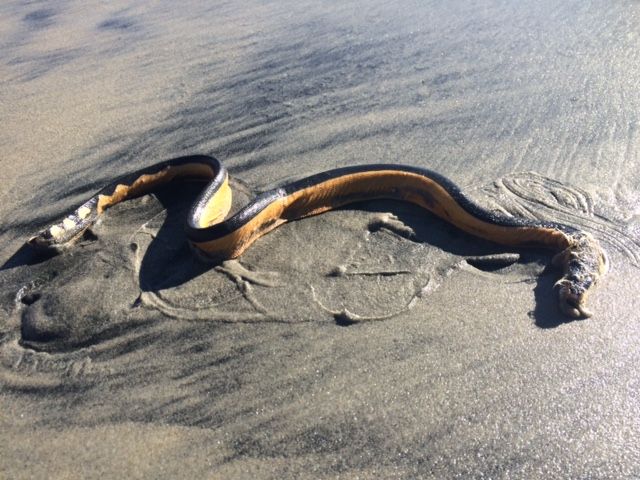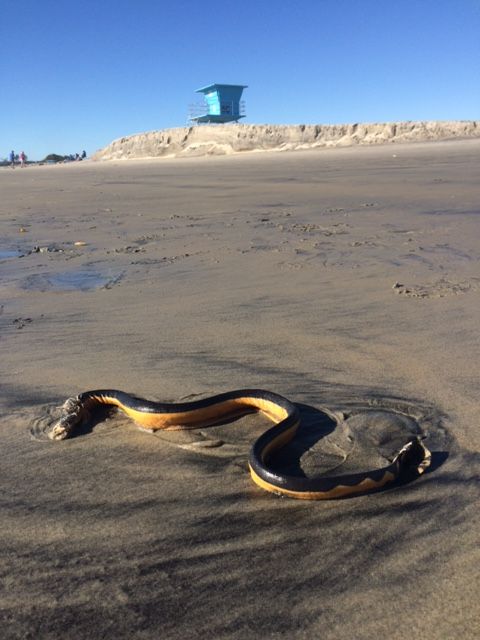Why Are Venomous Sea Snakes Washing Up on California Beaches?

A beachgoer got quite the slithery surprise when a 20-inch-long (50 centimeters) venomous sea snake washed ashore at Coronado Dog Beach near San Diego Tuesday (Jan. 12).
The yellow-bellied sea snake (Pelamis platura) is very uncommon in California, but three (including this latest sighting) have washed ashore in Southern California in the past few months.
The beachgoer who found the yellow-bellied sea snake Tuesday alerted lifeguards to the serpent at around 2:30 p.m. local time, according to a statement from the city of Coronado. They placed the lethargic snake in a bucket, but just like the other snakes of that species that have washed up recently on California beaches, it died soon afterward. The snake has since been turned over to the Scripps Institution of Oceanography.
Usually found in the tropical parts of the Pacific and Indian Oceans, including the western coast of Central America, Hawaii, Japan, and the eastern coast of Africa, these snakes have striking yellow bellies that serve as warning signals to other animals that they are venomous, meaning they inject a toxic substance when they bite a person or other animal. No human deaths have ever been reported as a result of P. platura. [See Photos of Snakes from Around the World]
Greg Pauly, assistant curator of herpetology at the Natural History Museum of Los Angeles, previously told Live Science that yellow-bellied sea snakes pose little threat to humans because their venom, fangs and small mouth size are better suited to smaller prey, such as tiny fish. Still, officials and experts advise people to keep their distance if they come across one of these snakes.

In total, only six yellow-bellied sea snakes have ever been reported north of the tip of Baja California, Mexico, Pauly said. Two were found on California beaches in 2015 — one on Oct. 16 at Silver Strand Beach in Ventura County, and the other on Dec. 12 at Bolsa Chica State Beach south of Los Angeles. Prior to that, the last reported sighting occurred in 1972.
Although experts are surprised by the sudden surge of P. platura in this area, the cause is relatively clear: Warmer waters in the equatorial Pacific Ocean, caused by El Niño, bring many unexpected tropical species northward through a mix of rising sea-surface temperatures and altered currents, expert say.
Sign up for the Live Science daily newsletter now
Get the world’s most fascinating discoveries delivered straight to your inbox.
"In general, we see fish moving north that are unusual in these areas — like hammerhead sharks or mahimahi — and it's unusual to see the snakes, but not unexpected when you have these really warm waters from the El Niño event," said Karen Martin, a professor of biology at Pepperdine University in Malibu, California.
What is less clear is why these snakes are washing up on beaches. Yellow-bellied sea snakes don't move well on land, so if they're on the shore, it is a sign they are unwell, Martin said. "[It] probably reflects the stress of them being far from home and maybe the travel — and possibly that they're getting out of their natural range and having difficulties as they get farther north," she said.
Sea snake sightings may be rare in Southern California, but they aren't the oddest creatures spotted in the area. In 2013, an 18-foot-long (5.5 meters) dead oarfish washed up on Catalina Island, followed a few days later by a smaller oarfish landing on a beach near San Diego. That wasn't the end of the surprises: When scientists took a look inside the smaller oarfish, they found hundreds of thousands of eggs in the animal's ovaries.
The Natural History Museum of Los Angeles requests that, if you do see a yellow-bellied sea snake, you report the sighting, along with a photo and a description of the location, to nature@nhm.org.
Follow us @livescience, Facebook& Google+. Original article on Live Science.










